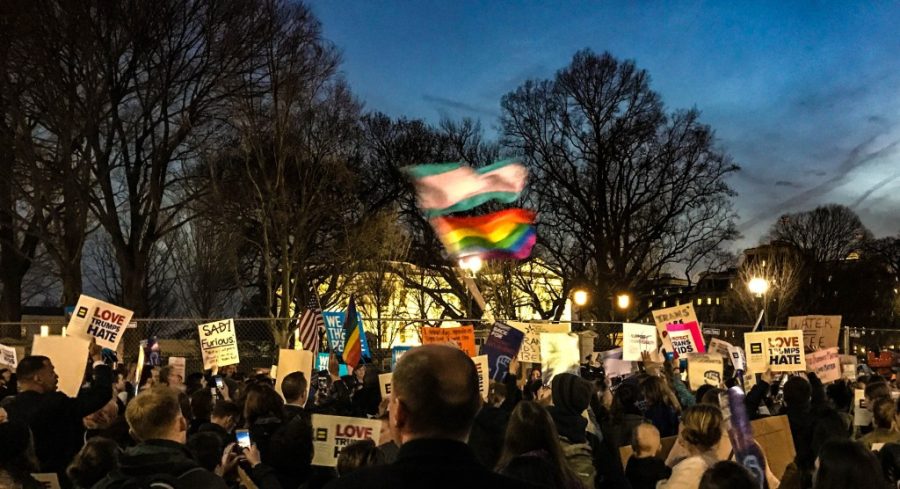‘Don’t Say Gay’ Bill Harms Kids and Muzzles Teachers

Ted Eytan, Flickr, Creative Commons
Photo Credit: Ted Eytan via Flickr
March 24, 2022
The Parental Rights in Education Bill passed the Florida Senate on Tuesday, March 8, and is expected to be signed into law by Republican Governor Ron DeSantis. House bill 1557 “prohibits classroom discussion about sexual orientation or gender identity” and has been more appropriately renamed by the American public as the Don’t Say Gay Bill.
The Don’t Say Gay Bill passed the senate with a slight majority at 22-17 votes and, if signed into law as expected, will make education surrounding the LQBTQIA+ community illegal in Florida. The bill allows parents to sue school districts, weaponizing prudish parents to ensure the effectiveness of the law which creates tension among educators who fear retaliation.
If teachers dare to discuss topics surrounding sexual orientation or gender identity in the classroom, their school district can be sued. This effectively criminalizes conversation of LQBTQIA+ content. The Don’t Say Gay Bill will restrict teachers’ ability to educate about these important topics, leading students to only be introduced to sexualities deemed appropriate, like heterosexuality, and gender expression considered correct, such as only girls wear dresses.
Originally, H.B. 1557 neglected to state the grade levels to which the bill applied, but it now explicitly states “classroom instruction by school personnel or third parties on sexual orientation or gender identity may not occur in kindergarten through grade 3,” while also modifying this statement by adding obscure jargon by saying “or in a manner that is not age appropriate or developmentally appropriate for students” and fails to define “age appropriate” or “developmentally appropriate.” In fact, the bill neglects to define the parameters of what classroom instruction means at all.
An amendment introduced on March 4 by the Florida State Senate Democratic Minority Leader, Lauren Book, elected to further define classroom instruction. The amendment listed specific examples of exceptions to the ban on conversation of sexuality and gender identity. Bullying prevention, a student’s individual education plan (IEP) or 504 plan, discussion between students, and questions asked by students and any answers were listed as exceptions to the bill in order to provide more flexibility to students and teachers in the classroom. The amendment failed to pass.
One can certainly ascertain from the failure of Book’s amendment that the Don’t Say Gay Bill means, in the most literal sense: don’t say gay.
This new law would explicitly apply to kindergarten through Grade 3 classrooms. However, without a proper definition of the terms “age appropriate” and “developmentally appropriate” as used in the bill, the law could be stretched to apply to upper grades like middle and high school classrooms. The implementation of this bill would be detrimental to the lives of LGBTQIA+ adolescents.
According to a national survey conducted by The Trevor Project, 42 percent of youth in the LGBTQIA+ community considered attempted suicide last year. The survey titled, LGBTQ Youth Mental Health 2021, identified that when these kids had access to spaces where their sexuality or gender identity was affirmed, attempted suicide rates lowered. Further, when transgender and nonbinary youth had their pronouns respected by all the people they live with, the attempted suicide rate was cut in half when compared with kids whose pronouns were not.
If home becomes a space where kids do not feel respected, school can become a safe haven. Kids spend a vast majority of their adolescent life at school and when they have friends and teachers they can trust and who support them as students and humans their quality of life increases.
To make matters worse, H.B. 1557 expects teachers to ‘out’ students to their parents if they discuss their sexuality or gender identity. Under the bill, a school district cannot have procedures or “student support forms that prohibit school district personnel from notifying a parent about his or her student’s mental, emotional, or physical health or well-being,” and also includes any procedures that “encourage or have the effect of encouraging a student to withhold from a parent such information.”
The possibility of criminalizing discussion about sexual orientation and gender identity in classrooms struck a nerve with the teenage population in Florida. School walkouts with students chanting, pumping colorful signs into the air, and vigorously waving their pride flags exemplify the way high schoolers are making their opinions heard. People are speaking out at their places of work too. An employee walkout took place at The Walt Disney Company in a fierce reaction after the company failed to publicly oppose the bill.
Protests are also occurring across the state, including one at the capitol in Miami. Hundreds of people gathered in Sarasota, Fl. on Feb. 27 to protest the House vote to approve the Don’t Say Gay Bill. Zander Moricz, a gay high school student in Florida, spoke at the protest sharing his outrage with the new bill. Moricz shared that he first came out to a teacher of his, and he feared that this new bill would eliminate that option for students.
“Think about what is going to happen when a child who experiences homophobia from the family they live with, the peers they learn with, the music they listen to and the movies they watch, the posts they tap through,” Moricz said. “And they now have to add the government and their governor to that list.”
There is no doubt that the Don’t Say Gay Bill would have catastrophic effects on the mental health and quality of schooling for older students, but what about the Kindergarten through Grade 3 kids this bill will most certainly impact?
Students at such a young age are developing cognitive skills by learning about the world around them. Exposure to people, cultures, places, and new experiences are vital in order to cultivate these skills. Young children are supposed to learn about love, and the different ways they can care about people. They are supposed to gain knowledge about themselves, what clothes and colors they like, and what gender means.
Sexuality and gender identity are not something to hide from young students until they are older or ‘have to know.’ In fact, kids who were introduced to sexuality at an older age have more trouble understanding the shift from a heteronormative mindset. Introducing the concept of sexuality and gender as a spectrum when kids are younger is an effective way for them to understand that other families might look different and provides a smoother transition to understanding their own sexuality and gender as they mature.
The Don’t Say Gay Bill stunts childhood development for children because it redacts those crucial aspects of education. A student that is a part of a family with two daddies or mommies is not too advanced for their peers to understand and it’s not inappropriate. H.B. 1557 inhibits education about the narratives many kids are living.
Children who are a part of cis-gender heterosexual nuclear families can see their story everywhere: watching Peppa Pig and pointing at Mummy Pig and Daddy Pig knowing that they have a mummy and a daddy. There will always be Barbie and Ken living their Dream House life together lining the walls of the toy aisles and in TV shows targeted towards these young audiences.
Sleeping Beauty and Snow White will receive a non-consensual kiss from their princes to save their life over and over again for every new generation of children who watch those movies or read those books or dress up as these characters. Not once has discussion of these heteronormative medias been prohibited in classrooms, denounced as widely inappropriate, or so heavily demonized in political discourse.
The Parental Rights in Education bill permits these heteronormative medias in classrooms while outlawing discussion and exposure to LGBTQIA+ representation.
But why does it matter if these young students know what being gay means? As one person wrote on Twitter, “To clarify: I don’t have an issue with elementary school kids being lectured about ‘gay or trans sexuality’ … I have an issue with elementary school kids being lectured about sexuality period.” Kids from a young age already learn what sexuality is, or at least what heterosexuality is, if not from the media they consume then from the family structure they are taught: mommy, daddy, and baby. H.B. 1557 eliminates discussion of other sexualities and therefore of other types of families. That is harmful to kids because representation matters.
When children are learning what the word “family” means, every child must be able to participate in those class discussions and see their reality reflected in the media they are permitted to consume.
If Governor DeSantis signs this bill, it will be illegal in Florida for teachers to keep books featuring non-heteroconforming content on the shelves of their classroom libraries.
“Reading kids literature that includes a variety of people and family structures is so important,” Tweets Adam Podowitz-Thomas, regarding his thoughts on the Don’t Say Gay Bill.
“It can be the first time a kid sees themselves in the heroes of a book. It can be the first time a kid sees their families represented.”
Podowitz-Thomas is married to a man and has a daughter, Edie, who had only been exposed to literature that enforced heteronormative family structures in her daycare program.
“When she was 3 or so, she took up the habit of describing any three objects, particularly if one was smaller, as “Mommy, Daddy, Baby”,” writes Podowitz-Thomas. He and his husband took it upon themselves to introduce Edie to more inclusive literature including a picture book called And Tango Makes Three which tells the story of two male penguins raising a baby penguin together.
When reading the picture book by Peter Parnell and Justin Richardson, Edie pointed at the penguin family and said “Mommy, Daddy, Baby.” Podowitz-Thomas and his spouse gestured to the family of penguins and told their daughter, “Daddy, Papa, Baby.”
“She turns to us and looks, with the biggest, widest eyes I have ever seen,” Tweets Podowitz-Thomas, “and say [sic], questioning ‘Daddy, Papa, Edie?’ We hugged her, said yes, and then proceeded to read the story.”
The book And Tango Makes Three “became a favorite for several weeks. For months afterwards [sic], she referred to herself as Tango.”
There are hundreds of students like Edie throughout elementary schools in Florida who deserve to be represented in the literature they read. Not only that, but the students they go to school with should be provided the space and resources to understand what other types of family structures exist and that love is not exclusive to feelings between mommies and daddies.
However, upon DeSantis’s signature, H.B. 1557 will take effect July 1, 2022, and there will no longer be And Tango Makes Three on the shelves of any Florida elementary school classroom library introducing kids to a family with same-sex parents. Neither will there be the children’s picture book I am Jazz which explains gender expression and what transgender means in a clear and accessible way.
Next school year, elementary students in Florida will be robbed of the freedom to see themselves and their families in the stories they are learning how to read. Yet another nail will be pounded into the coffin of progress towards LGBTQIA+ representation in America.



